
Audie Leon Murphy was an American soldier, actor, and songwriter. He was one of the most decorated American combat soldiers of World War II. He received every military combat award for valor available from the United States Army, as well as French and Belgian awards for heroism. Murphy received the Medal of Honor for valor that he demonstrated at the age of 19 for single-handedly holding off a company of German soldiers for an hour at the Colmar Pocket in France in January 1945, before leading a successful counterattack while wounded and out of ammunition.

Dixie Wanda Hendrix was an American film and television actress.
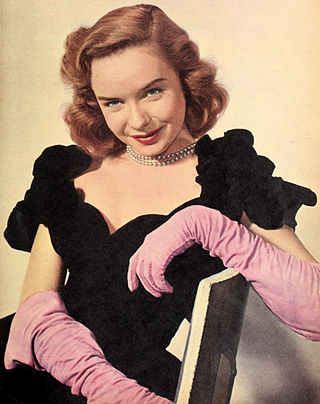
Diana Marie Lynn was an American actress.
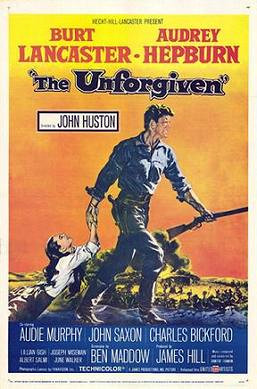
The Unforgiven is a 1960 American Western film directed by John Huston, and starring Burt Lancaster and Audrey Hepburn. Filmed in Durango, Mexico, the supporting cast features Audie Murphy, Charles Bickford, Lillian Gish, John Saxon, Joseph Wiseman, Doug McClure and Albert Salmi. The story is based upon the 1957 novel by Alan Le May, author of The Searchers. Uncommonly for its time, the film spotlights the issue of racism against Native Americans and people who were believed to have Native American blood in the Old West. The film is also known for its problems behind the scenes.

Ride a Crooked Trail is a 1958 American Western film shot in CinemaScope and Eastman Color, with former World War II hero Audie Murphy and future Academy Award-winning actor Walter Matthau heading a strong if not well-known cast.

Spring Break is a 1983 American sex comedy film directed and produced by Sean S. Cunningham. It stars David Knell, Perry Lang, Paul Land and Steve Bassett. The film follows two sets of two college guys spending a spring break together in Fort Lauderdale, Florida.

Nancy Gates was an American film and television actress.

The Gun Runners is a 1958 American film noir crime film directed by Don Siegel, is the third adaptation of Ernest Hemingway's 1937 novel To Have and Have Not, and starring Audie Murphy. Everett Sloane essays the part of the alcoholic sidekick originally played by Walter Brennan in the film's first adaptation, although Sloane's interpretation is less overtly comic. Eddie Albert delivers a bravura performance as a charismatic villain; other cast members include Jack Elam and Richard Jaeckel. Gita Hall, "Miss Stockholm of 1953", made her Hollywood film debut as Albert's girlfriend Eva.

Cowboy from Brooklyn is a 1938 American Western musical romantic comedy film directed by Lloyd Bacon and written by Earl Baldwin. It stars Dick Powell, Pat O'Brien and Priscilla Lane. The film was based on the 1937 Broadway play Howdy Stranger by Robert Sloane and Louis Pelletier.
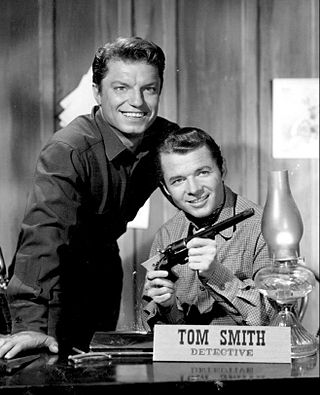
Whispering Smith is an American Western television series that originally aired on NBC. It has the same ultimate source material as the 1948 film of the same name, but differs in some significant respects.
Barry Benefield was an American writer, some of whose books were adapted for the cinema. His being born and spending much of his life in Texas is more than a biographical detail: Benefield had been mentioned as "One of The Lone Star writers", who "Followed the Southern tradition".
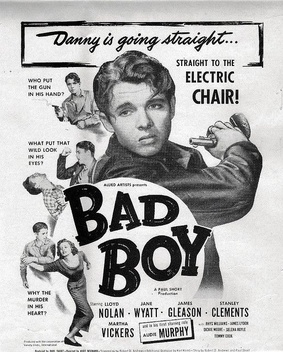
Bad Boy is a 1949 American drama film directed by Kurt Neumann and starring Audie Murphy, Lloyd Nolan and Jane Wyatt. It was Murphy's first leading role. It was distributed by the independent studio Allied Artists.
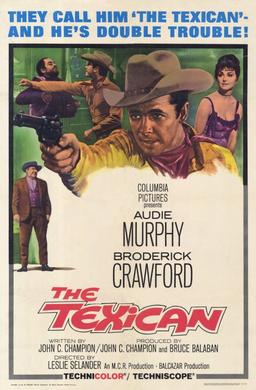
The Texican is a 1966 American Techniscope Western film produced and written by John C. Champion and directed by Lesley Selander. It is a paella western remake of their 1948 film Panhandle adapted for the persona of Audie Murphy that featured Broderick Crawford as the heavy. The film was re-titled Ringo il Texano in Italy to coincide with the popularity of the Ringo Spaghetti Western film series.
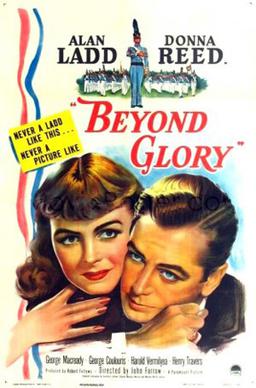
Beyond Glory is a 1948 American drama film directed by John Farrow and starring Alan Ladd and Donna Reed. Written by William Wister Haines, Jonathan Latimer, and Charles Marquis Warren, the film is about a former soldier who thinks he may have caused the death of his commanding officer in Tunisia. After visiting the officer's widow, they fall in love, and she encourages him to attend the United States Military Academy at West Point.

The Kid from Texas is a 1950 American Western film that was Audie Murphy's first Technicolor Western and the first feature film on Murphy's Universal-International Pictures contract. It was directed by Kurt Neumann and featured Gale Storm and Albert Dekker.
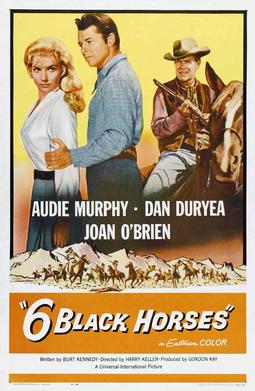
Six Black Horses is a 1962 American Western film directed by Harry Keller and starring Audie Murphy, Dan Duryea and Joan O'Brien.
Gunpoint is a 1966 American Western film directed by Earl Bellamy and starring Audie Murphy. It was Murphy's final film for Universal Pictures.

Audie Murphy was a highly decorated American soldier and Medal of Honor recipient who turned actor. He portrayed himself in the film To Hell and Back, the account of his World War II experiences. During the 1950s and 1960s he was cast primarily in westerns. While often the hero, he proved his ability to portray a cold-blooded hired gun in No Name on the Bullet. A notable exception to the westerns was The Quiet American in which he co-starred with Michael Redgrave. Murphy made over 40 feature films and often worked with directors more than once. Jesse Hibbs who directed To Hell and Back worked with the star on six films, only half of which were westerns. When promoting his 1949 book To Hell and Back he appeared on the radio version of This Is Your Life. To promote the 1955 film of the same name, he appeared on Ed Sullivan's Toast of the Town. He was a celebrity guest on television shows such as What's My Line? and appeared in a handful of television dramas. Murphy's only television series Whispering Smith had a brief run in 1961. For his cooperation in appearing in the United States Army's Broken Bridge episode of The Big Picture television series he was awarded the Outstanding Civilian Service Medal.

Audie Murphy was one of the most decorated United States Army combat soldiers of World War II, serving from 1942 to 1945. He received every American combat award for valor available at the time of his service, including the Medal of Honor. He also received recognitions from France and Belgium. With his 1945 military discharge at the end of the war, Murphy became an advocate of treatment for post-traumatic stress disorder in veterans. The Audie L. Murphy Memorial VA Hospital in San Antonio and the Sergeant Audie Murphy Clubs (SAMC) on military bases honor his contributions. He joined the Texas National Guard in 1950, transferring to reserve status in 1956 and remaining in the Guard until 1969. He also had a civilian career as a film actor and songwriter. Recognitions he received both during his lifetime and posthumously are listed below.

















